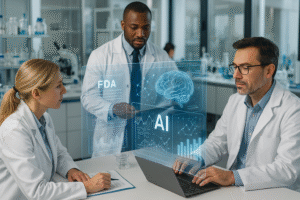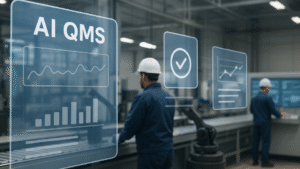Artificial intelligence is transforming the very fabric of our working world. As AI capabilities rapidly advance, a new generation of cutting-edge occupations is emerging – roles that simply didn’t exist just a few short years ago.
Aspiring professionals who lead in AI adoption can secure future-proof careers in a rapidly progressing field. For business owners, integrating AI-driven roles means staying competitive, fostering innovation, and positioning your company for sustained growth in a tech-powered market.
Here, we dive into 10 of the most promising AI roles that are poised to reshape the workforce of tomorrow. We’ll also discuss the key steps you can take right now to prepare yourself for these new career opportunities.
10 Emerging Careers Shaped by AI
1. AI Ethics Specialist
As AI systems become increasingly sophisticated and influential across industries, there is a critical need to ensure they are developed and deployed responsibly.
AI ethics specialists will play a vital role in assessing the potential societal impacts and risks of AI applications. Their key duties include:
- Advising on ethical AI principles and guidelines
- Collaborating with policymakers on governance frameworks
- Mitigating unintended biases and privacy concerns.
- Making sure AI empowers rather than endangers humanity.
Also read: Deepfakes: Embracing the Challenge to Strengthen Media Literacy
2. Autonomous Vehicle Fleet Manager
Self-driving cars? No longer a futuristic concept. They’re here and autonomous vehicle fleets are poised to revolutionize transportation as we know it.
Autonomous vehicle fleet managers will be responsible for overseeing the day-to-day operations of these advanced transportation networks. They’ll be primarily tasked to:
- Monitor fleet performance and optimize routing
- Liaise with regulatory bodies and the public
- Ensure efficient operations of autonomous mobility systems
- Address growing demand as autonomous vehicle tech matures.
3. Robotic Process Automation (RPA) Developer
Repetitive, rules-based tasks are a prime target for automation through RPA technology.
RPA developers will design and implement sophisticated software “robots” to streamline workflows, integrate disparate systems, and redirect human workers toward more strategic, complex, high-value work.
- Automate routine, time-consuming processes to boost efficiency
- Focus on process optimization, systems integration, and change management
- Drive organizational productivity through automation.
4. AI Training Data Specialist
The quality and diversity of training data are essential for building accurate and unbiased AI models.
AI training data specialists will be instrumental in curating, labeling, and preparing comprehensive data sets to support the development of cutting-edge machine learning applications.
They will:
- Work with data scientists to guarantee data quality
- Maintain rigorous standards for high-performing AI systems
- Emphasize data fairness, quality, and privacy compliance.
5. Algorithmic Bias Auditor
As AI-powered decision-making becomes increasingly prevalent across industries, there is a growing need to identify and mitigate the risk of algorithmic bias.
Algorithmic bias auditors will be dependable in investigating the root causes of biased outcomes and recommending adjustments to promote fairness and accountability. In summary:
- Audit AI models for data and algorithm inconsistencies
- Address biases to promote fair treatment and ethical practices
- Ensure AI benefits all rather than only privileged groups.
6. Conversational Interface Designer
Intuitive and engaging conversational experiences with chatbots,
AI assistants, and voice interfaces will become increasingly important as AI-powered interactions become more ubiquitous.
Conversational interface designers will apply principles of natural language processing and human-computer interaction to create seamless, user-friendly conversational experiences.
Their key tasks are to:
- Design visual, auditory, and conversational aspects of AI interfaces
- Create natural, user-friendly interactions for seamless human-AI collaboration
- Define future user experiences with AI technology.
7. AI Product Manager
Bridging the gap between technical AI capabilities and user needs will be vital for the successful commercialization of AI-powered products and services.
AI product managers will oversee the strategic development and go-to-market planning for innovative AI-driven offerings.
- Oversee product life cycles from roadmapping to post-launch optimization
- Balance technological potential with real-world application
- Drive AI adoption and effectiveness.
8. AI Cybersecurity Analyst

As AI becomes more embedded in business operations, cybersecurity threats have also grown more sophisticated. So much so that specialized analysts are needed to safeguard systems.
AI cybersecurity analysts are then to develop strategies to protect sensitive data and infrastructure from cyber attacks.
Key tasks of AI cybersecurity analysts include:
- Using AI to monitor systems in real-time for unusual activities or vulnerabilities.
- Quickly identifying breaches and developing protocols to contain and address threats.
- Collaborating with developers to implement security measures and improvements.
9. AI Futurist
Anticipating the long-term implications of AI on industries, economies, and society will be indispensable for strategic planning and innovation.
AI futurists will analyze emerging trends, forecast future scenarios, and advise organizations on how to navigate the AI-driven landscape.
- Identify opportunities and risks within AI advancements
- Offer forward-looking insights for businesses and policymakers
- Support ethical and sustainable AI-driven decision-making.
10. Sustainable AI Systems Engineer
The environmental impact of AI infrastructure and applications is an increasing concern.
Sustainable AI systems engineers will design and develop AI systems that minimize energy consumption, resource utilization, and carbon footprint.
They’ll work to promote green AI practices across the industry.
- Collaborate on guidelines for environmentally responsible AI development
- Prioritize energy efficiency and resource optimization
- Align AI progress with global sustainability goals.
Other AI roles that’ll emerge include AI-assisted healthcare specialists, natural language processing (NLP) scientists, computational linguists, and AI-enhanced education specialists, among others. These positions highlight AI’s expanding influence across various fields.
Preparing for the AI-Driven Future
To thrive in these emerging AI-powered roles, you’ll need to:
- Develop a strong foundation in computer science, data science, and machine learning
- Stay informed about the latest AI trends, technologies, and best practices through ongoing learning and professional development
- Cultivate in-demand soft skills like critical thinking, problem-solving, and adaptability
- Pursue relevant certifications, training programs, and hands-on experience to build your expertise
- Network with professionals in the AI industry and join communities of practice to stay connected and informed
Final Thoughts
The rise of artificial intelligence is ushering in a profound transformation of the workforce. It’s giving way to a new generation of exciting and impactful career paths.
At Theosym, we believe humans will always take the lead, with AI as a collaborative partner to automate routine tasks.
We empower people by providing them with AI agents that support and enhance the impact they bring to businesses and companies.
If you need an assistant to streamline your workflow, our Human-AI Augmentation virtual assistant (HAIA VA) system is designed exactly for your needs.
Book a consultation today for a quote and tailored advice.



